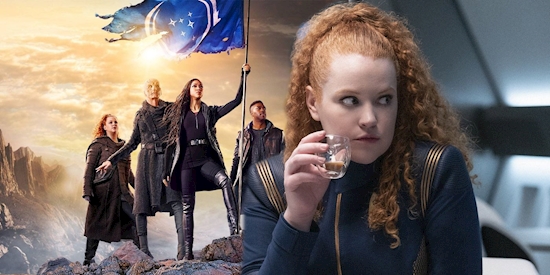Why Star Trek: Discovery Has So Much Swearing
Star Trek: Discovery has been known to push the boundaries of the Star Trek franchise, and using more colorful language, i.e. swear words, is one of the ways the show accomplishes this. Star Trek: Discovery premiered in 2017 and has continually taken a grittier stance on the Star Trek universe. The first season set its sights on tackling the Klingon War and the Mirror Universe, the second season dealt with the potential for the extinction of all sentient life, and it seems the third season will be following the same tradition, dealing with a future which offers a bleak outlook for the Federation. Discovery does strive to offset its darker aspects with optimism and humor, but for the most part, the show relies on some pretty hopeless situations to drive its main storylines. It isn't hard to see why Discovery might push the envelope in the language department as well.
Click the button below to start this article in quick view. Start nowSwearing on Star Trek isn't an entirely new concept. When Star Trek: The Original Series premiered back in 1966, there were lots of rules about what actors could and couldn't say on network television. Even with these rules, TOS managed to get a few minor swears past the censor, like "damn" and "hell." Mild profanity has been used with increasing frequency during subsequent series in the franchise, and the s-bomb was even dropped a few times during the films, but it was not until the first season of Star Trek: Discovery that an f-bomb was uttered from the mouth of a Star Trek character, specifically Silvia Tilly, the eager engineering ensign who ironically is one of the show's most optimistic characters.
Most of the reason for the more liberal use of swear words in Discovery however has nothing to do with the tone the show is trying to set: it's purely logistical. Unlike every show that came before it in the franchise, Discovery is released exclusively on streaming services, namely CBS All Access in the US and Netflix in the UK. This means that although the show is licensed by a major network, it doesn't premiere on prime time television, and isn't beholden to the usual censorship rules about profanity and other sensitive topics. This gives the show freedom to explore darker plotlines and put as many swears as they'd like into their dialogue, something Discovery's showrunners have taken advantage of.
Not everyone sees this new freedom as a good thing. When then-Cadet Tilly first dropped the f-bomb back during season one, some dissenting opinions were raised. Critics stated that the swear, while matching the grittier tone of the show, felt jarring and wrong and contributed to the show being deemed "not Star Trek." For the most part, however, Discovery hasn't overly abused its ability to use dirty words. In fact, as the seasons have progressed, it seems as though fans and critics alike have gotten used to them, and in turn, the writing staff has gotten better at deploying them in such a way that makes them feel appropriate to the situation and serves to humanize the characters who use them.
With so many hit television shows being released via streaming recently, audience sensitivity towards things like swearing and other once-taboo subject matter has decreased dramatically, as more and more shows are allowed the creative freedom to say and do what they like. This same freedom has allowed Star Trek: Discovery to expand the definition of what a Star Trek series can look like. And, while the change might have been jarring at first, there is no doubt that it has pushed the franchise into new and interesting territory.
About The AuthorSource: screenrant.com

